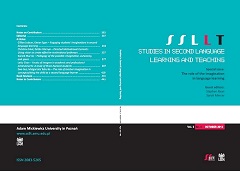Pedagogy of the possible: Imagination, autonomy, and space
Pedagogy of the possible: Imagination, autonomy, and space
Author(s): Garold Murray Subject(s): Language and Literature Studies
Published by: Wojskowe Biuro Historyczne im. gen. broni Kazimierza Sosnkowskiego
Keywords: imagination; self-directed learning; ecology; affordances, autonomy; space; metacognition
Summary/Abstract: This paper explores pedagogical practices which can support the role of imagination in foreign language learning. Over the past decade, work on self and identity in motivation research - most notably Norton's (2001) imagined communities and Dornyei's (2009) L2 motivational self system - has suggested that teachers might foster students' motivation by helping them imagine themselves as L2 speakers and envisage contexts or communities in which they might use the target language. if teachers are to help students create and sustain visions of L2 identities, they need to employ a pedagogy which incorporates and facilitates the work of imgination. In order to provide guidelines for pedagogical practice, this paper examines the experieces of japanese university studets studying English as a foreign language in a self-directed learning course. Prior analysis of the data revealed several affordances which supported the participants' metacognitive development and the role of imagination in their learning. Using these affordances as a conceptual framework, this paper builds on previous work by identifing elements in the learning environment which appear to support the role of imagination in the students' language learning. The paper concludes by suggesting guidelines for pedagogical practice and considering the implications for further study.
Journal: Studies in Second Language Learning and Teaching
- Issue Year: III/2013
- Issue No: 3
- Page Range: 377-396
- Page Count: 19
- Language: English

